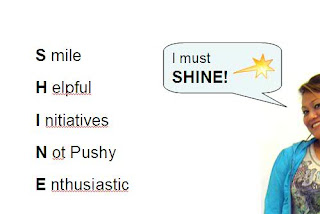- de-clutter the slides
- be more comfortable with flip charts
- remove the unnecessary WSQ 'stuff'
- have clear phrase or title to an activity
- give personal experiences
- 'Use it' and 'Lose it' slides
- enough to cover for 20mins
- speak at a comfortable pace
- watch our body language
- too much text on slides
- must have activity
- activity to link with learning
I've also spent more time wondering and reflected on several important points that were constantly mentioned throughout the last few weeks... and I asked myself over and over again!
"Is the activity important to be included?""Are the activities worth having?"
"How does it link or help with the learning?""Did they learn?"
"Within this 20mins, did you meet the learning outcome?"
"Was there active learning?"
"Was it presentation or facilitation?"
These were ringing in my head constantly and the more I asked myself, the more mindful I've become. I'm very sure I'm conscious with them from now on.
* * * * * * * * * *
While I was preparing for SP2, I laid out lots of ideas, cracked my head figuring different approaches and ways to facilitate for this class. It wasn't easy trying to determine if the activities are suitable, or not. Eventually I gave up wondering and went ahead with the activity involving my favourite and old-school - Hula Hoops. I've made slight adjustments to the activity though.

The Magic Hula HoopsThis activity was originally designed in our customer service training to
In class last night, I changed some of the rules. Since they were 'acting' as managers instead of a regular operations colleagues and also the age and professional background consideration,
the new rules and instructions were


Then, there was this second activity that was to link to the concept I wanted to drive next. Here are the cards that they had to sort out.
 I came up with this theory because I know they had to be given something catchy and easy to remember. The word 'shine' is rather relevant thus I've expanded it with meanings.
I came up with this theory because I know they had to be given something catchy and easy to remember. The word 'shine' is rather relevant thus I've expanded it with meanings.

In this activity, I gave them the Header and the Descriptions and they were to match them and explain their choices afterwards to each other within the group. An intimate small-group sharing time!
I'll review and give examples for every step after the group sharing so there will be interactions between learners and facilitator about 'SHINE' .
My turn came and went and no one, except H, caught my nervousness. I must say they were extremely kind with their comments and feedback to me. I felt that, especially after I saw the timer flashing the amount of time I have left, I've kind of lost my thoughts and abruptly ended the session skipping the final explanation and debrief of the last 'SHINE' activity, just to meet the time-requirement. Shame. Though in real life this wouldn't happen but still, it came as a form of setback which I know I must work very hard on.

The Magic Hula HoopsThis activity was originally designed in our customer service training to
- show that customer service must be smooth in a cycle with no breakage from greetings to goodbye
- establish the importance of teamwork and help them conceptualize that once the circle (team) is broken, tasks cannot flow smoothly
- emphasize the difficulty and importance of serving many customers at the same time(different hoops were inserted at different points) and not to compromise on our service.
In class last night, I changed some of the rules. Since they were 'acting' as managers instead of a regular operations colleagues and also the age and professional background consideration,
the new rules and instructions were
- the movements of the body now represents a task or work flow in the store
- the hoops inserted represents the significance of how customer service loops through all other tasks and emerged as the most important focus in the store
- the manager role was created to give the team opportunities to strategize whereby they could improve the speed in passing the hoops and made the rounds smooth, therefore emphasizing the importance of a store leader's role
- no restrictions on time to let them feel and fiddle with the concept as they would likely want to process the outcome and link.


Then, there was this second activity that was to link to the concept I wanted to drive next. Here are the cards that they had to sort out.
 I came up with this theory because I know they had to be given something catchy and easy to remember. The word 'shine' is rather relevant thus I've expanded it with meanings.
I came up with this theory because I know they had to be given something catchy and easy to remember. The word 'shine' is rather relevant thus I've expanded it with meanings.
In this activity, I gave them the Header and the Descriptions and they were to match them and explain their choices afterwards to each other within the group. An intimate small-group sharing time!
I'll review and give examples for every step after the group sharing so there will be interactions between learners and facilitator about 'SHINE' .
My turn came and went and no one, except H, caught my nervousness. I must say they were extremely kind with their comments and feedback to me. I felt that, especially after I saw the timer flashing the amount of time I have left, I've kind of lost my thoughts and abruptly ended the session skipping the final explanation and debrief of the last 'SHINE' activity, just to meet the time-requirement. Shame. Though in real life this wouldn't happen but still, it came as a form of setback which I know I must work very hard on.
* * * * * * * * * *
I reviewed the video when I was home. Horrified.
I remembered hearing PS used the word 'actually' many times and K used plenty of 'ok'. I think I was worse. I caught it on the video and I've used a million 'k' (short for ok). How could I not know?
Thank goodness for such recording!
No matter what, I have to be even more mindful with what I say from now on.
At the end of the evening when a few of us stayed behind to help, Dr P said we are going through Transformational Learning and elaborated how she saw the alienation in us during the first few sessions. How did she know???? But she is right, isn't she? It was an uncomfortable process only because we were so accustomed to handling things the way we've always done them, to train the way we've always been doing, to speak and present the way we're so comfortable with.
Through the process, we've reframed our mind to see the importance and outcome differently with totally new focus while planning the lesson plans, slides and activities. Most importantly, we've experienced these changes ourselves in motion, and in action, through both our SP, as well as the process of contextualising an existing lesson plan to fit in an Adult Learning Theory.
 After that she encouraged us saying she could see that we are more conscious and mindful now and she looked so genuinely happy - A trainer's satisfaction comes from the learners' learning and the learners' genuine appreciation. That's what all of us strive to achieve at work everyday, isn't it? :)
After that she encouraged us saying she could see that we are more conscious and mindful now and she looked so genuinely happy - A trainer's satisfaction comes from the learners' learning and the learners' genuine appreciation. That's what all of us strive to achieve at work everyday, isn't it? :)
Speaking for myself at least, that first few lessons I wasn't understanding the meaning and concept of it all and yes, it was a very uncomfortable process. Eventually and true enough, as she said so convincingly during our first evening, that we'd be transformed by the end of FAL - I assured her last night that we did! I felt her hard work paid off.
Thank you.
Thank goodness for such recording!
No matter what, I have to be even more mindful with what I say from now on.
* * * * * * * * * *
At the end of the evening when a few of us stayed behind to help, Dr P said we are going through Transformational Learning and elaborated how she saw the alienation in us during the first few sessions. How did she know???? But she is right, isn't she? It was an uncomfortable process only because we were so accustomed to handling things the way we've always done them, to train the way we've always been doing, to speak and present the way we're so comfortable with.
Through the process, we've reframed our mind to see the importance and outcome differently with totally new focus while planning the lesson plans, slides and activities. Most importantly, we've experienced these changes ourselves in motion, and in action, through both our SP, as well as the process of contextualising an existing lesson plan to fit in an Adult Learning Theory.
 After that she encouraged us saying she could see that we are more conscious and mindful now and she looked so genuinely happy - A trainer's satisfaction comes from the learners' learning and the learners' genuine appreciation. That's what all of us strive to achieve at work everyday, isn't it? :)
After that she encouraged us saying she could see that we are more conscious and mindful now and she looked so genuinely happy - A trainer's satisfaction comes from the learners' learning and the learners' genuine appreciation. That's what all of us strive to achieve at work everyday, isn't it? :)Speaking for myself at least, that first few lessons I wasn't understanding the meaning and concept of it all and yes, it was a very uncomfortable process. Eventually and true enough, as she said so convincingly during our first evening, that we'd be transformed by the end of FAL - I assured her last night that we did! I felt her hard work paid off.
Thank you.











